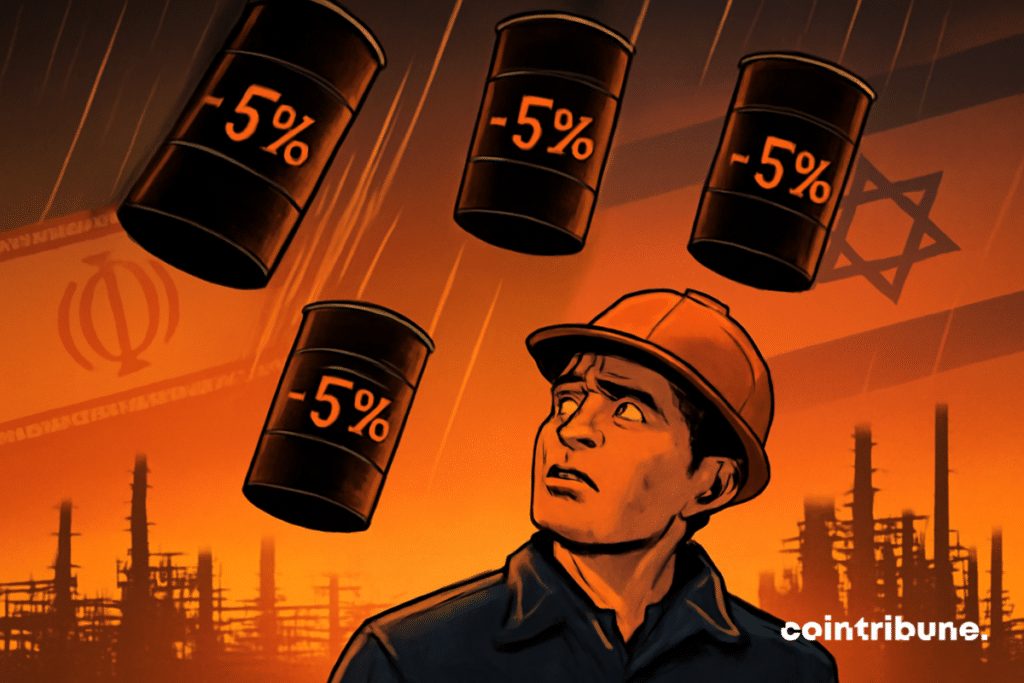Oil Prices Plunge as Israel-Iran Ceasefire Shocks Markets—Traders Scramble
Geopolitical shockwaves just rocked crude markets.
Black gold tumbles as Middle East tensions ease
Oil futures nosedived overnight after Israel and Iran unexpectedly declared a temporary ceasefire. The surprise detente sent Brent crude spiraling below key psychological levels—because nothing makes traders panic like the absence of war.
Market bloodbath as 'peace premium' vanishes
Futures contracts got slaughtered faster than a Wall Street intern's morale. The selloff accelerated as algorithmic traders—who'd been pricing in eternal conflict—scrambled to adjust their models. Meanwhile, energy analysts rushed to downgrade forecasts with the urgency of a hedge fund covering bad bets.
The cynical playbook remains unchanged
Expect OPEC+ to suddenly 'discover' production issues within 48 hours. Nothing stabilizes prices like conveniently timed supply disruptions—ask any commodities desk that's ever collected a seven-figure bonus.

In Brief
- Oil falls more than 5% after the announcement of a ceasefire between Israel and Iran.
- Stock and crypto markets rebound thanks to geopolitical easing.
- The agreement between Israel and Iran eases tensions and reduces fears of disruptions in the Strait of Hormuz.
- Uncertainty remains, but hopes of de-escalation positively impact the markets.
Trump Diplomacy Shakes Energy Markets
Donald TRUMP hit hard. His explosive announcement on Truth Social of a ceasefire between Iran and Israel triggered an immediate shockwave in oil markets.
Traders, caught off guard, massively sold off their positions, causing a dramatic drop in prices.
North Sea Brent crude fell by 5.02% to $67.89, while US WTI tumbled 5.21% to $64.94.
This plunge followed an already notable 7% decline the day before, reflecting extreme nervousness among traders amid geopolitical tensions.
Israel’s acceptance of the US proposal was immediately welcomed by the markets. Tel Aviv announced it had achieved “all objectives” of its military campaign against Iran, paving the way for the long-awaited de-escalation.
However, Iran has not yet officially confirmed the agreement, with Foreign Minister Abbas Araghchi stating that “no deal” exists at this stage.
This violent reaction in prices perfectly illustrates the “war premium” that had accumulated over recent days. Investors feared massive retaliation capable of disrupting the Strait of Hormuz, a strategic passage through which 20% of global oil production transits.
The limited Iranian strike against the US base at Al Udeid in Qatar ultimately reassured markets about Tehran’s intention not to escalate further.
Oil Prices Facing Their Real Drivers
Beyond the geopolitical effect, this drop reveals oil prices’ fragility against market fundamentals.
Stephen Innes, analyst at SPI Asset Management, underscores that “Tehran played the caution card to avoid shaking the foundations of the oil market“.
Shipping lanes remained open, ruling out the specter of a supply crisis.
This situation highlights structural imbalances in the oil market. Global demand remains under pressure, hindered by economic uncertainties linked to Trump’s trade wars.
Meanwhile, global supply remains abundant with high inventories, vast reserve capacities available from OPEC+, and flourishing US shale gas production.
Global stock markets immediately benefited from this easing. Tokyo closed up 1.08%, Seoul jumped 2.96%, and Sydney gained 0.95%.
This euphoria is explained by the easing of fears over a major military escalation that could have destabilized the global economy. Paris is not left behind with a CAC 40 up 1.25%, buoyed by hopes of a return to normal.
A Fragile Calm in an Explosive Context
Despite this improvement, analysts remain cautious. Michael Wan from MUFG bank reminds us that “the details of the ceasefire agreement are still unclear”.
The easing is therefore not definitively secured, especially as Iran maintains an ambiguous position on this agreement.
This situation perfectly illustrates the extreme volatility of energy markets in the face of geopolitical tensions. Oil prices remain at the mercy of the slightest diplomatic or military incident in the Middle East. The region concentrates a considerable share of global production, making every political tremor a potential catalyst for an energy crisis.
The evaporation of the “war premium” mechanically benefits global stock markets and sensitive sectors like tourism. Air France-KLM soars 9.65% in Paris, while TotalEnergies retreats 3.45%, a victim of falling oil prices.
This reshuffling of the cards demonstrates how interconnected markets are and how they instantly react to geopolitical signals.
Trump’s strong-arm diplomacy seems to be paying off, at least temporarily. The question remains if this calm will withstand the test of time in a region where balances remain precarious.
Maximize your Cointribune experience with our "Read to Earn" program! For every article you read, earn points and access exclusive rewards. Sign up now and start earning benefits.

